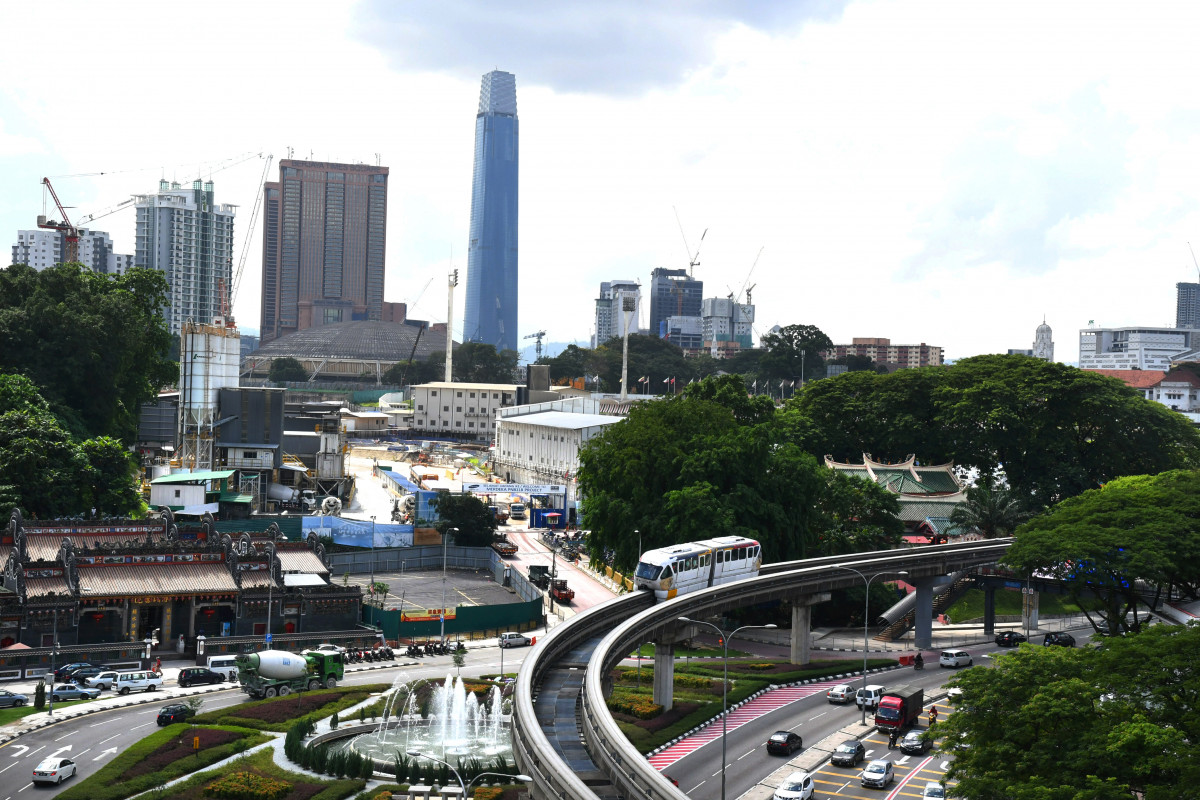Malaysia's property sector poised for sustainable growth in 2023, says Knight Frank

- The residential property market staged a strong rebound in 2022 with a 22.4% yearly increase in sales volume and a corresponding 22.6% growth in sales value following normalisation of economic activity.
- In Selangor, Grade A offices, especially in well-connected locations that also offer a wide array of amenities, are witnessing good take-up amid steady rental level.
- The return of international tourists, particularly from China, following increased flight routes and frequencies, is positive for the retail sector.
- The industrial market in Klang Valley continues to gain momentum, propelled by a surge in demand from end-users, manufacturers, and investors
KUALA LUMPUR (Aug 4): Malaysia’s good growth momentum, underpinned by strong pick-up in domestic demand, improving labour market conditions as well as favourable government policies have supported the real estate sector.

This was revelead by Knight Frank Malaysia’s Real Estate Highlights 1st Half of 2023 report that was released earlier this week.
Keith Ooi, Group Managing Director, Knight Frank Malaysia said that “the real estate sector has shown promising signs of growth and resilience during the first half of this year, supported by favourable economic landscape. However, amid growing external headwinds, Bank Negara Malaysia (BNM) expects the country’s economic growth to moderate to between 4.0% and 5.0% in 2023, underpinned by firm domestic demand.”
Residential sector
The residential property market staged a strong rebound in 2022 with a 22.4% yearly increase in sales volume and a corresponding 22.6% growth in sales value following normalisation of economic activity (2022: 243,266 residential transactions valued at RM94,319.43 million/2021: 198,825 residential transactions valued at RM76,903.22 million). In the first quarter of this year (1Q2023), 53,923 residential properties with collective value of RM20,874.56 million changed hands.
“During the review period, the condominium/serviced apartment segment in Kuala Lumpur experienced mixed trend in prices,” said Judy Ong, senior executive director of Research and Consultancy, Knight Frank Malaysia.
The localities of Kenny Hills and Mont’Kiara witnessed price growth, while for KL City and Bangsar, there were slight dips in the average transacted prices.

As for the localities of Ampang Hilir/U-Thant and Damansara Heights, the prices held steady. Overall, the average transacted prices of high-end condominiums / serviced apartments in Kuala Lumpur were marginally lower by circa 1.3% in 1H2023 when compared to the preceding period (2H2022).
The recovery of the residential property market remains cautiously optimistic albeit at a slower pace, weighed down by rising borrowing costs and inflationary pressures amid a slowing economy.
Office sector
In KL Fringe, market demand for office spaces remains steady, displaying healthy rental and occupancy levels, driven by tight supply of high-quality decentralised offices, particularly in areas with ease of accessibility and adequate transportation links. Some MNC occupiers are prepared to accept a slight premium to enjoy the benefits of this locality.
In Selangor, Grade A offices, especially in well-connected locations that also offer a wide array of amenities, are witnessing good take-up amid steady rental level. Good quality decentralised office spaces with attractive rental packages remain favourable to capture market demand.
“We are observing strengthening market activity as the business climate continues to stabilise. Enquiry activity is on the rise as companies experiencing growth are seeking expansion and exploiting the tenant market to leverage the opportunity to upgrade the quality of the office space they occupy,” said Teh Young Khean, executive director of Office Strategy and Solutions, Knight Frank Malaysia.

“Adding impetus to this flight to quality is the emphasis on ESG targets by companies with global mandates and landlords are strengthening their portfolios to deliver spaces that can match these requirements. The commercial office market in Kuala Lumpur continues to be dynamic and activity in sector is encouraging,” added Teh.
Retail sector
Malaysia’s retail sales expanded 13.8% in 1Q2023 following an impressive growth of 33.3% for the full year of 2022. However, with slowing global growth amid weaker economic outlook, annual retail sales growth for 2023 is projected to moderate to 4.8%.
The MIER Consumer Sentiments Index (CSI) fell below the 100-point optimism threshold to record at 99.2 points in 1Q2023. Reversing the positive trajectory since 2Q2022, the current reading signifies declining consumer confidence due to weaker employment and income growth prospects amid high inflationary environment (MIER Employment Index 4Q2022: 122.5 points / 1Q2023: 109.8 points).
Yuen May Chee, director of Property Management, Knight Frank Malaysia said the next half of the year (2H2023) will see the scheduled completions/openings of The Exchange TRX and Pavilion Damansara Heights (Phase 1); two highly anticipated shopping centres with a collective retail space of circa 1.83 million sq ft.

With the changing landscape in consumers attitudes, behaviours and purchasing habits, stakeholders are placing greater emphasis on convenience and accessibility as well as creating immersive experiences to drive sales. They are also pivoting towards sustainability and ESG initiatives, backed by regulators and financial institutions.
The return of international tourists, particularly from China, following increased flight routes and frequencies, is positive for the retail sector. However, the upcoming Luxury Goods Tax in 2H2023 could impact luxury goods' competitiveness and deter tourist arrivals, potentially affecting retail sales growth. Despite this, the local retail sector is expected to sustain due to stable labour market as well as firm domestic demand.
Industrial sector
In 1Q2023, Malaysia attracted RM71.4 billion in investments, generating 23,977 new job opportunities. Approved foreign direct investments (FDI) contributed RM37.5 billion (52.5%), with Singapore leading the way (RM11.5 billion), followed by significant contributions from the British Virgin Islands, China, Hong Kong and South Korea. The remaining RM33.9 billion (47.5%) came from domestic direct investments (DDI). This demonstrates impressive growth compared to RM42.8 billion invested in 1Q2022.
Malaysia's market potential and institutional strengths is evident from the recent commitments made by industry giants, Tesla and Amazon Web Services.
In comparing the two quarters, the volume of transactions in 1Q2023 was lower by around 22.5% compared to 4Q2022. However, there was an 8.3% increase in sales value. The average value per industrial transaction also saw a significant rise, from approximately RM3.49 million in 4Q2022 to about RM4.88 million in 1Q2023.The overall prices and rental in industrial sector have experienced an incline across the nation.
“The industrial market in Klang Valley continues to gain momentum, propelled by a surge in demand from end-users, manufacturers, and investors. This growth can be largely attributed to the geopolitical climate and proactive government initiatives aimed at bolstering economic activities,” said Allan Sim, executive director of Land and Industrial Solutions at Knight Frank Malaysia.

The forthcoming completions of major infrastructure projects, such as the West Coast Expressway (WCE) and the East Coast Rail Link (ECRL) by 2025 and 2027 respectively, are set to revolutionise connectivity between industrial areas in the region. “This is foreseen to have a profound and positive impact on the industrial and logistics markets, paving way for enhanced efficiency and competitiveness. As a result, the region is expected to witness a spark in growth of well-planned industrial parks leveraging on the infrastructure development of the country,” added Sim commented.
Additionally, Malaysia as a preferred FDI destination is further cemented through the announcements of incoming data centre players like Australia’s NEXTDC’s KL1 and Bridge Data Centres (BDC) which is expanding its hyperscale data centre called MY03. The mushrooming of data centre developments in Malaysia, supported by a significant uptake of 113 MW in 2022, has positioned Malaysia as the most attractive destination for data centre investment as indicated by the Knight Frank SEA-5 Data Centre Opportunity Index.
Looking to buy a home? Discover exclusive rewards and vouchers for your dream home when you sign in to EdgeProp START.
Never miss out
Sign up to get breaking news, unique insights, event invites and more from EdgeProp.
Latest publications
Malaysia's Most
Loved Property App
The only property app you need. More than 200,000 sale/rent listings and daily property news.
